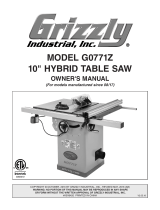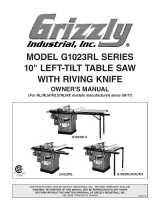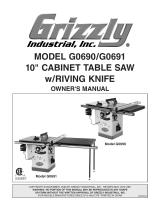
COPYRIGHT © MARCH, 2010 BY WOODSTOCK INTERNATIONAL, INC. (TR)
WARNING: NO PORTION OF THIS MANUAL MAY BE REPRODUCED IN ANY SHAPE OR
FORM WITHOUT THE WRITTEN APPROVAL OF WOODSTOCK INTERNATIONAL, INC.
MODEL D4061
5-PIECE SAFETY KIT
INSTRUCTION SHEET
Figure 3. Featherboard placement.
Figure 4. Measuring saw blade height.
Figure 5. Measuring router bit cutting depth.
Push Stick & Push Block
Featherboard
The featherboard is used to keep workpieces pressed firmly
against the cutting fence. The design of the featherboard
allows the workpiece to move in the direction of the cutting
path and causes resistance if moved in the other direction.
As a result, the chance of kickback is reduced and more
accurate cuts can be made. Only use this featherboard in a
standard
3
⁄4" miter gauge slot.
To use the featherboard:
1. Place the workpiece evenly against the fence like you
would normally do before cutting. Make sure it is about
1
⁄2" behind the blade.
2. Slide the bottom bar of the featherboard into the
3
⁄4"
miter gauge slot, making sure the fingers slant toward
the blade (see Figure 3).
Combination Gauge
To use the combination gauge with a table saw:
1. DISCONNECT POWER TO THE SAW!
2. Position the combination gauge over the saw blade and
adjust the saw blade to the desired height (see Figure
4).
Measuring the blade with the
combination gauge is an
extremely dangerous procedure
if attempted with power con-
nected to the machine. DO NOT
perform this procedure with the
machine connected to power!
To use the combination gauge with a router:
1. DISCONNECT POWER TO THE ROUTER!
2. Position the combination gauge over the router bit as
shown Figure 5, and adjust the height of the router bit
to the desired cutting depth.
3. Position the fingered edge of the featherboard against
the edge of the workpiece, so that all of the fingers
contact the workpiece, and slide the featherboard
toward the blade until the first finger is approximately
1
⁄2" in front of the blade.
4. Double check the workpiece and the featherboard to
ensure they are properly positioned as described in Step
3, then tighten the two thumb screws to secure the
featherboard in place. Push the featherboard with
light/moderate pressure to make sure it is mounted
tightly.
Note: The featherboard should be placed firm enough
against the workpiece to keep it against the fence but
not so tight that it is difficult to push the workpiece
into the blade.
5. When the featherboard is secure, you may then power
up the saw. Use a push stick or push block to feed the
workpiece into the blade as normal.
Direction of Cutting Path
If you need help with your new 4-piece safety kit, call our
Technical Support Department at Woodstock International, Inc.
or email at tech-support@woodstockint.com
The Model D4061 Safety Kit is intended to aid in
many types of machinery. Read and follow all safety
instructions for each machine used with this safety
kit. Failure to do so may result in personal injury or
property damage.
12703
Manufactured in China
for Woodstock International, Inc.
D4061
5-PIECE SAFETY KIT
u|xhGJEDDy49866lz[
360-734-3482 • FAX: 360-671-3053
SHOP FOX
®
IS A REGISTERED TRADEMARK OF
Wear ANSI approved safety glasses
Figure 1. Using the push stick.
Figure 2. Using the push block.
Push sticks and push blocks are designed to keep your hands
away from the cutting blades. These accessories allow you to
cut small or narrow pieces with a greater level of safety.
To use the push stick and push block:
1. Place the notched end against the end of the workpiece
and away from the cutting path of the blade as shown in
Figure 1-2.
2. Using a steady downward and forward pressure, push
with the push stick or push block in a way that your
hands would not be cut by the blade if the push stick or
push block were to slip from the workpiece.
/


